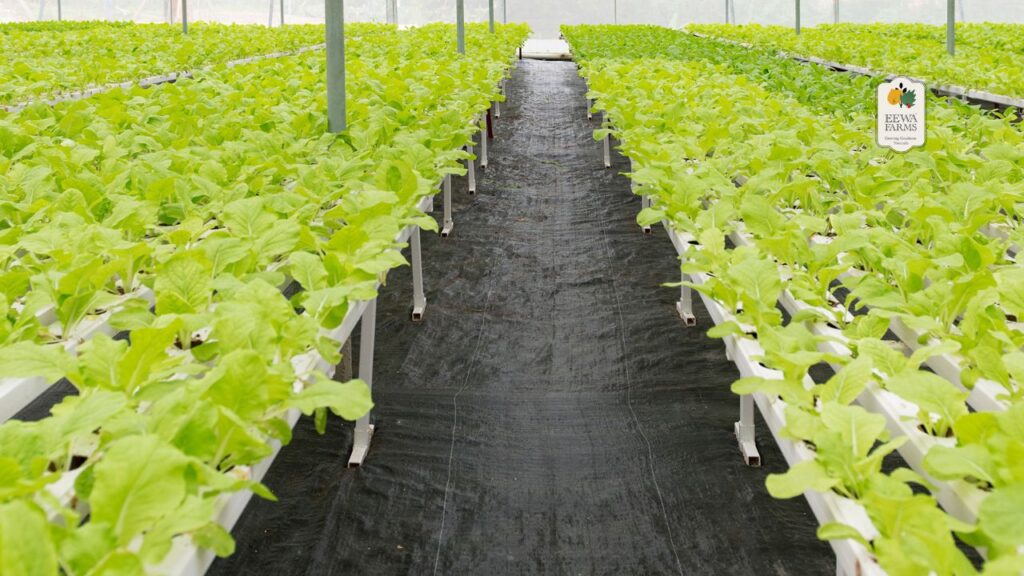The Environmental Advantages of Hydroponic Farming

Our planet faces unprecedented environmental challenges, including climate change, water scarcity, and land degradation. While essential for feeding the world, conventional agriculture contributes significantly to these issues. Hydroponic farming has emerged as a promising solution in search of sustainable alternatives.
Hydroponics offers many environmental benefits by cultivating plants in nutrient-rich water solutions without soil. This article delves into how hydroponic farming can revolutionize agriculture and contribute to a healthier planet. Hydroponics presents a compelling case for a more sustainable future, from conserving water and minimizing land use to reducing pesticide reliance and improving nutrient efficiency.
Let’s explore how this innovative farming method can help address pressing environmental concerns and create a greener world.
Understanding Hydroponic Farming: A Sustainable Agricultural Revolution
Hydroponic farming, a cutting-edge agricultural method, transforms how we grow food. This soilless cultivation technique involves growing plants in nutrient-rich water solutions, providing them with all the necessary minerals for optimal growth. By eliminating the need for soil, hydroponic systems offer numerous environmental benefits, making them a sustainable and innovative solution for modern agriculture.
Soilless Agriculture
Traditional farming relies heavily on soil, which can be susceptible to degradation and erosion. Hydroponic farming, however, bypasses these issues entirely. By using alternative mediums such as coconut coir, perlite, or even just water, hydroponics ensures that plants receive consistent and balanced nutrition without the need for soil.
Modern Farming Techniques
Hydroponic systems use advanced technology to monitor and modify nutrient levels, pH, and water quality, resulting in ideal growing conditions. These advanced agricultural techniques provide exact control over the growth environment, resulting in larger yields and healthier plants.
Sustainable Crop Production
Hydroponic farming offers several environmental benefits, including its sustainable crop production. Hydroponics encourages an approach to agriculture that is more effective and environmentally beneficial by maximizing resource use and decreasing waste. This sustainable crop production method is essential for meeting the growing global food demand without further straining our planet’s resources.
Water Conservation: How Hydroponics Drastically Reduces Water Usage
Water scarcity is a pressing global issue, with traditional agriculture being one of the largest consumers of freshwater. Hydroponic farming offers a solution that uses significantly less water than conventional farming methods.
Water-Efficient Farming
Hydroponic systems are designed to be highly water-efficient, using up to 90% less water than traditional soil-based agriculture. This is accomplished by limiting waste by reusing and circulating the water within the system.
Closed-Loop Systems
Many hydroponic setups utilize closed-loop systems, where water is continuously recycled and reused. This increases the system’s sustainability by saving water and lowering the requirement for frequent water changes.
Water Recycling
The ability to recycle water in hydroponic farming contributes to its environmental benefits. Hydroponic systems can operate efficiently even in water-scarce regions by capturing and reusing water, making them an ideal solution for drought-resistant agriculture.
Minimizing Land Use: Vertical Farming and Urban Agriculture
As urbanization continues to expand, the availability of arable land is decreasing. Hydroponic farming addresses this challenge by enabling vertical farming and urban agriculture, maximizing the use of limited space.
Vertical Hydroponic Systems
Vertical farming is the practice of producing crops in stacked levels, usually within regulated indoor settings. Hydroponic systems are ideal for vertical farming because of their small form and efficient use of space.
Urban Farming Solutions
Hydroponic farming can be integrated into urban settings, providing fresh produce to city dwellers while reducing the need for long-distance transportation. By doing this, the carbon impact of food distribution is reduced, and a consistent supply of wholesome, locally sourced food is guaranteed.
Space-Efficient Agriculture
By utilizing vertical hydroponic systems, urban farming can thrive in areas with limited space, such as rooftops and vacant lots. This space-efficient agriculture model helps to bring food production closer to consumers, promoting food security and sustainability.
Rooftop Gardens
Rooftop hydroponic gardens situated on rooftops are gaining popularity in cities across the globe. These rooftop gardens increase the air quality and contribute to urban greening by converting underutilized rooftop space into fruitful agricultural land.
Eliminating Soil Degradation and Erosion
Soil degradation and erosion are major environmental issues caused by traditional farming practices. Hydroponic farming offers a solution by eliminating the need for soil, thereby preventing these detrimental effects.
Soil Conservation
By growing plants without soil, hydroponic farming helps conserve this vital resource. This soil conservation is crucial for maintaining healthy ecosystems and preventing land degradation.
Preventing Topsoil Loss
Topsoil, the most fertile layer of soil, is often lost due to erosion and poor agricultural practices. Hydroponics prevents topsoil loss by completely bypassing the use of soil, ensuring that this valuable resource remains intact.
Reducing Agricultural Runoff
Agricultural runoff, which carries fertilizers and pesticides into water bodies, can lead to water pollution and ecosystem damage. Hydroponic systems reduce the risk of runoff by containing and recycling water within a closed system.
Sustainable Land Use
Hydroponic farming promotes sustainable land use by reducing the need for large agricultural fields. This allows for preserving natural habitats and reduces the pressure on land resources.
Pesticide Reduction: Creating a Cleaner, Safer Environment
Overusing pesticides in traditional farming has raised concerns about environmental pollution and human health. Hydroponic farming offers a cleaner and safer alternative by significantly reducing the need for chemical pesticides.
Pest-Resistant Crops
Hydroponic systems can cultivate pest-resistant varieties of crops, reducing the reliance on chemical pesticides. This contributes to a cleaner and safer environment for both humans and wildlife.
Organic Hydroponic Farming
Many hydroponic farms adopt organic practices, avoiding synthetic chemicals altogether. Organic hydroponic farming produces healthy, chemical-free produce, promoting environmental and human health.
Reduced Chemical Use
Hydroponic farming minimizes harmful chemicals by providing a controlled environment less susceptible to pests and diseases. Reducing chemical use helps create a safer and more sustainable farming system.
Environmentally Friendly Pest Control
Hydroponic systems often employ environmentally friendly pest control methods, such as biological controls and natural predators. These methods help to maintain a balanced ecosystem and reduce the impact of agriculture on the environment.
Year-Round Production: Decreasing Food Miles and Carbon Footprint
One of the standout advantages of hydroponic farming for the environment is its ability to produce crops year-round. This capability reduces the need for long-distance transportation and lowers the overall carbon footprint of food production.
Local Food Production
Hydroponic systems, including urban centres, can be set up almost anywhere, allowing for local food production. This reduces the distance food needs to travel from farm to table, decreasing transportation emissions and enhancing food security.
Reduced Transportation Emissions
By producing food locally, hydroponic farming helps to cut down on transportation-related carbon emissions. This is a significant step towards reducing the overall carbon footprint of agriculture.
Fresh Produce Availability
Hydroponic farming ensures the availability of fresh produce throughout the year, regardless of seasonal changes. This consistent fresh food supply supports healthier diets and reduces the dependency on imported goods.
Climate-Controlled Farming
Hydroponic systems are often housed in climate-controlled environments, enabling year-round production. This increases crop yields and ensures that fresh produce is available even in adverse weather conditions.
Nutrient Efficiency: Optimizing Plant Growth While Minimizing Waste
Hydroponic farming is known for its nutrient efficiency, providing plants with precisely what they need for optimal growth while minimizing waste.
Precision Nutrient Delivery
Hydroponic systems deliver nutrients directly to plant roots in precise amounts, ensuring efficient uptake and reducing wastage. This precision nutrient delivery enhances plant growth and productivity.
Tailored Plant Nutrition
Hydroponic systems allow for the customization of nutrient solutions to meet the specific needs of different plants. This tailored plant nutrition results in healthier crops and higher yields.
Reduced Fertilizer Runoff
Traditional farming often results in fertilizer runoff, which can pollute water bodies and harm aquatic life. Hydroponic systems minimize this risk by containing and reusing nutrient solutions, reducing environmental impact.
Eco-Friendly Farming Practices
Hydroponic farming promotes eco-friendly practices by optimizing resource use and minimizing waste. This approach supports sustainable agriculture and helps to protect the environment.
Biodiversity Conservation: Preserving Natural Habitats
The expansion of traditional agriculture has often come at the expense of natural habitats. Hydroponic farming offers a solution by reducing land needs and promoting biodiversity conservation.
Wildlife Protection
By minimizing the need for large agricultural fields, hydroponic farming helps to protect wildlife habitats. This contributes to the conservation of biodiversity and the protection of endangered species.
Reduced Deforestation
The environmental advantages of hydroponic farming include its role in reducing deforestation. Hydroponics minimizes the pressure to clear forests for agriculture by producing more food in less space.
Sustainable Land Management
Hydroponic systems promote sustainable land management by optimizing available space and resources. This approach helps to preserve natural landscapes and maintain ecological balance.
Ecosystem Preservation
Hydroponic farming supports ecosystem preservation by minimizing the environmental impact of agriculture. By reducing land use, water consumption, and chemical inputs, hydroponics helps to maintain healthy ecosystems.
Conclusion:
In summary, the environmental advantages of hydroponic farming are vast and varied. From conserving water and land to reducing pesticide use and carbon emissions, hydroponic systems offer a sustainable alternative to traditional agriculture. By embracing hydroponic farming, we can create a greener and more sustainable future, ensuring we meet the growing global food demand without compromising our planet’s health. It’s time to recognize the potential of hydroponic farming and support its adoption to benefit our environment and future generations.

